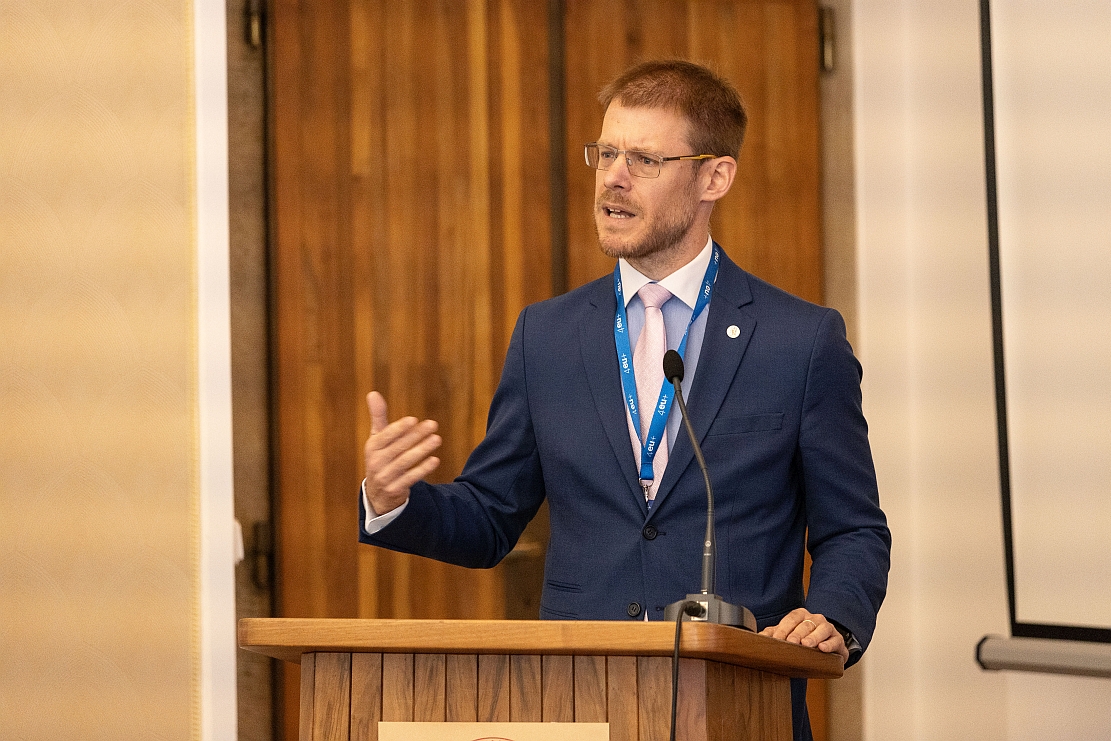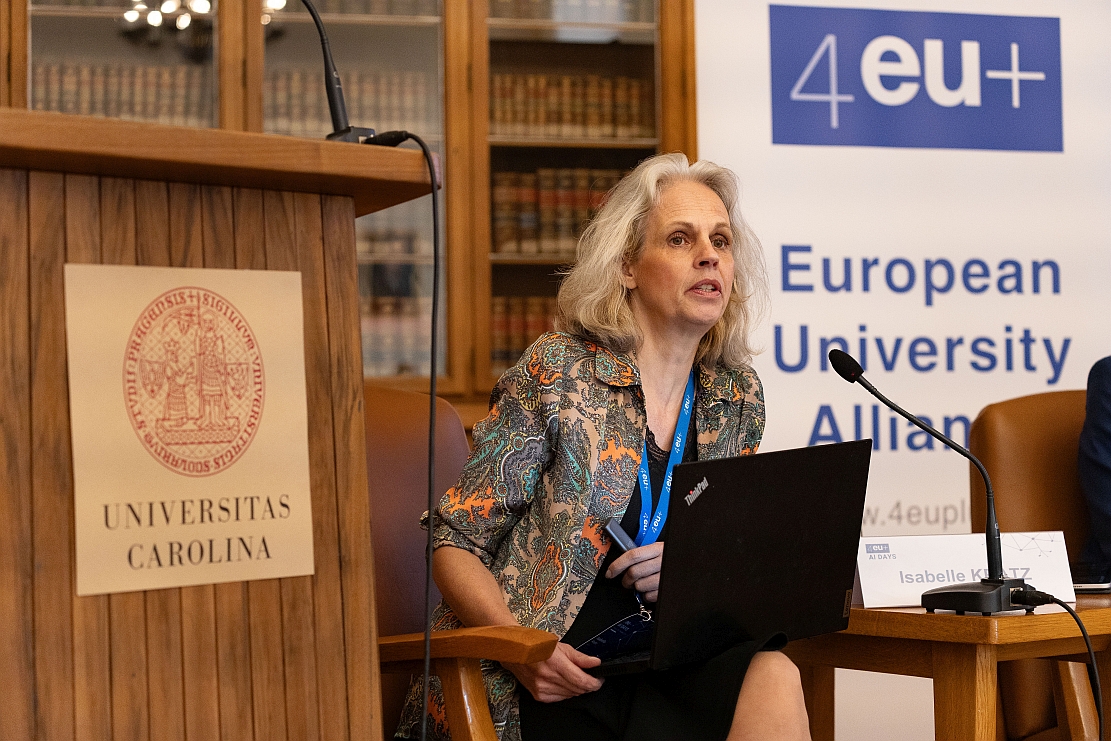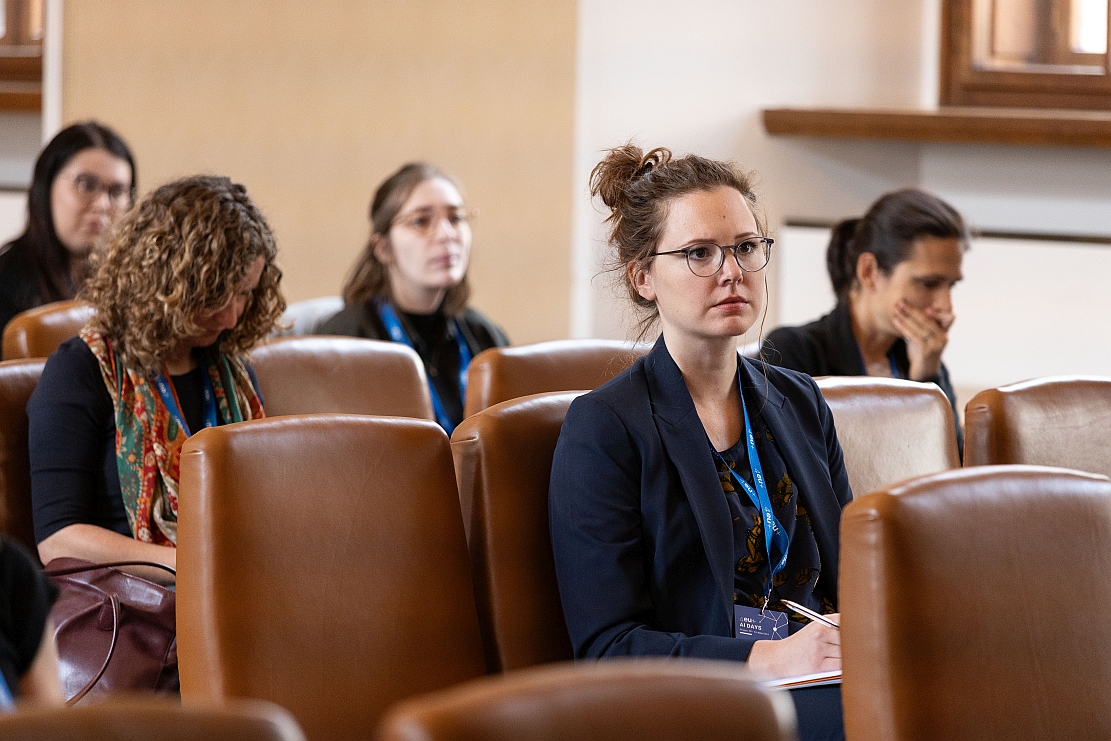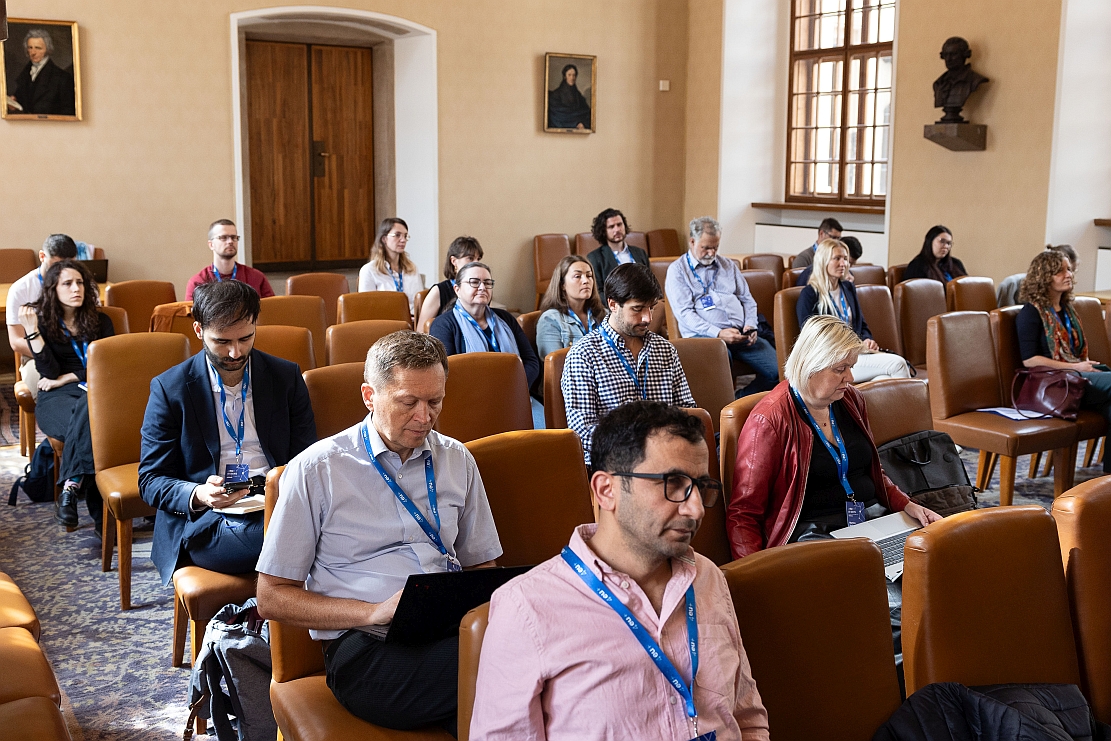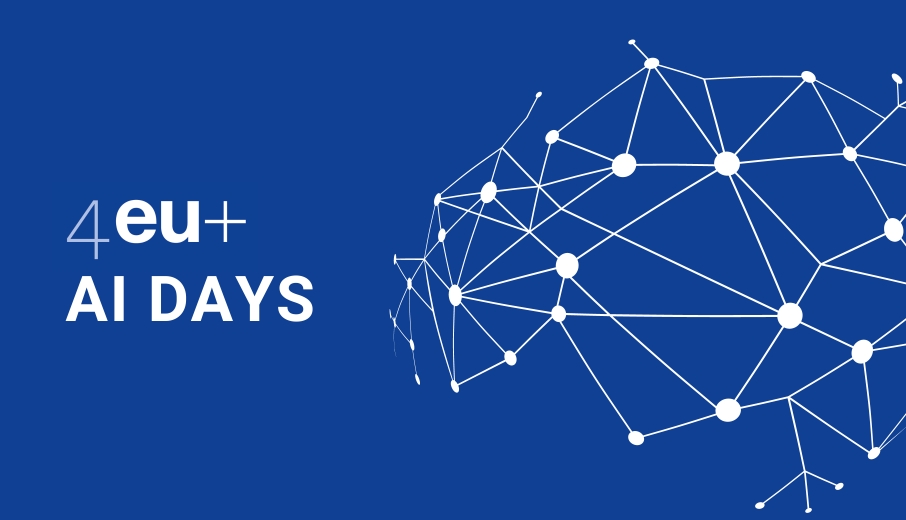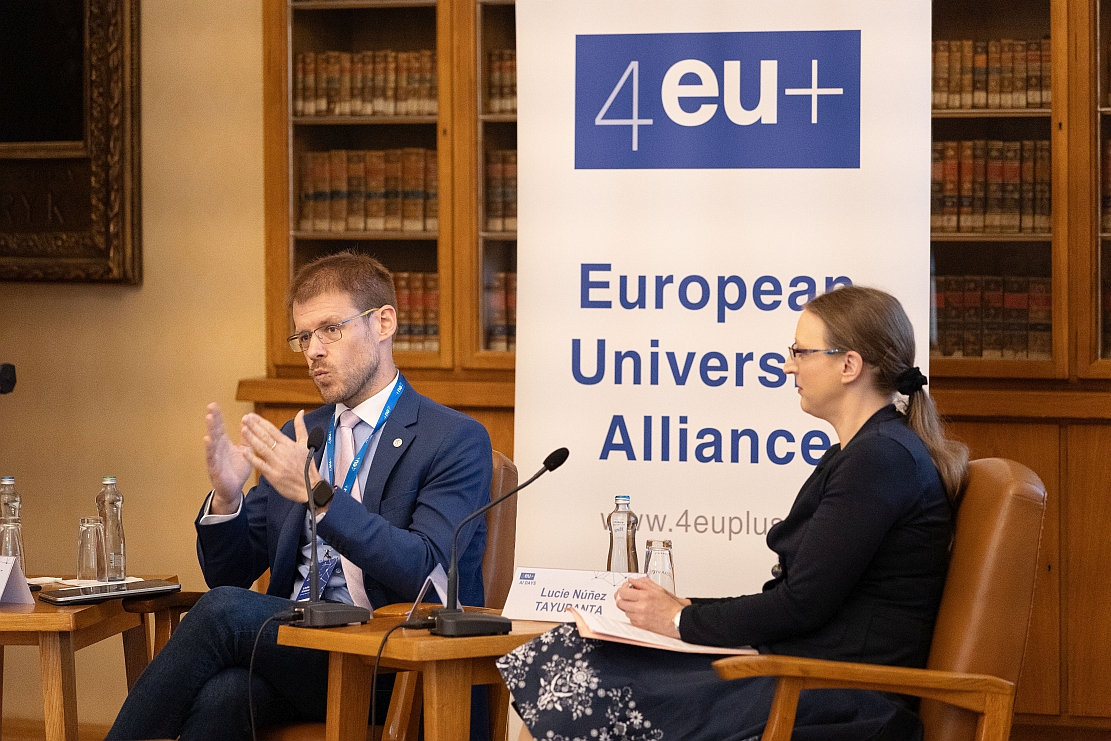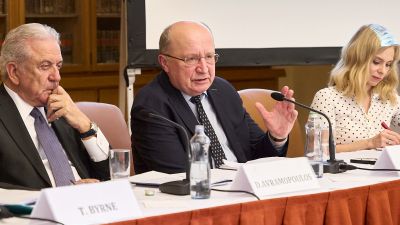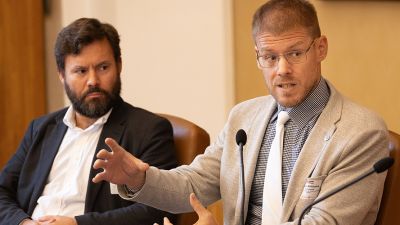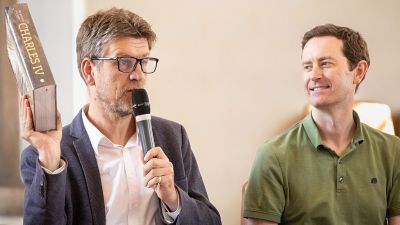On Friday, Charles University wrapped up a fascinating two-day event, bringing together researchers, policymakers, educators, PhD students and administrative staff within the 4EU+ Alliance to explore the ever-growing impact of AI on society, including education. The alliance is home to eight prestigious European research-intensive universities that can play key roles in the future of artificial intelligence, including in the area of safeguards and ethical questions.
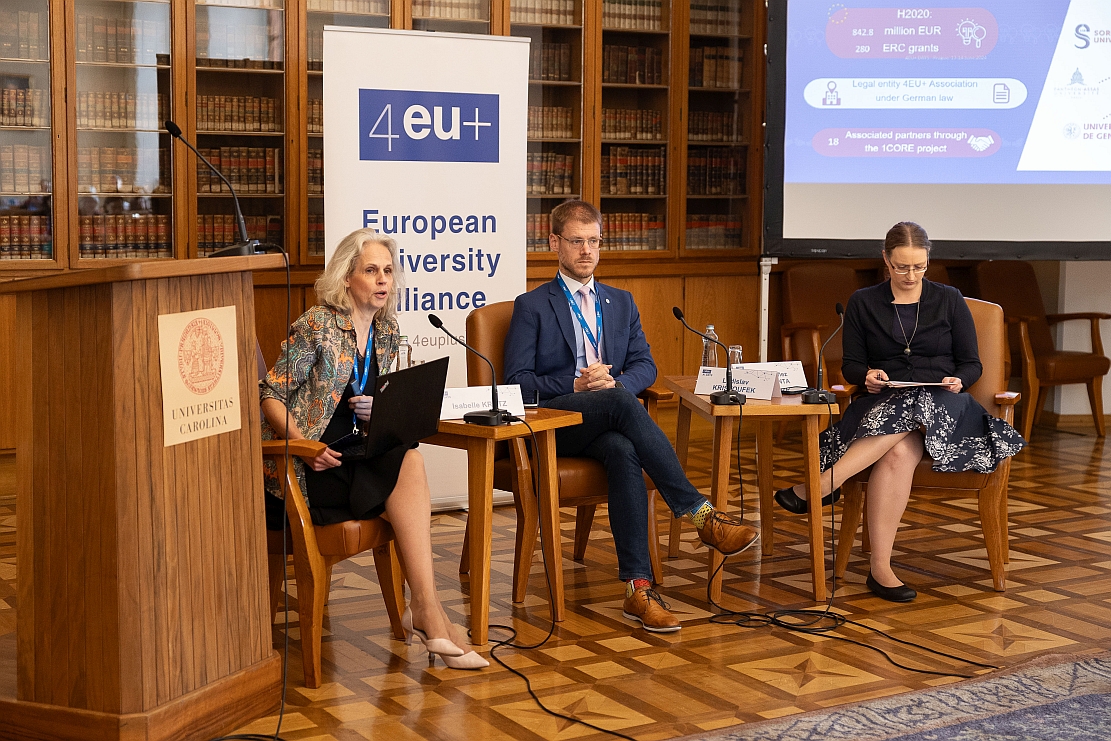
CU Vice-Rector for Research Ladislav Krištoufek. Left: the Secretary General of 4EU+ Isabelle Kratz. Right: Lucie Núñez Tayupanta.
The aim of 4EU+ AI Days at Charles University provided a broad array of discussions, debates, question periods and workshop and networking opportunities for attendees, and it met its goals swimmingly. The event was organised as part of the alliance’s 1CORE project, which stands for One Comprehensive Research-Intensive European University, further boosting cooperation and mobility within the alliance that includes members like Charles University, Sorbonne University, and the University of Heidelberg to name three of eight (you can learn about all the member universities and more about the 4EU+ Alliance, here).
Artificial intelligence has understandably grown in importance in recent years, spilling over from technical fields into the humanities and social sciences and many studies or investigative approaches now are grappling with how AI will change everything from work to our personal lives. Opening the first bloc of the event, Charles University’s Vice-Rector for Research, Ladislav Krištoufek and colleagues, the Secretary General of 4EU+ Isabelle Kratz and Ministry of Education, Youth and Sports representative Lucie Núñez Tayupanta, agreed that AI “is all around us”, with the vice-rector adding the caveat that many in the public still did not fully appreciate how much society, universities, the research landscape and even the world are bound to change.
Ladislav Krištoufek:
“AI has become a buzzword but it’s meaning is still fuzzy for many people… [If we set aside discussions] of dystopias, one of the things helping to keep things ‘real’ is actually meeting and seeing what people are doing, learning and sharing what our experiences are. Because this is obviously not a Czech topic, it is not a European topic, it is a global topic and we need to find solutions together.”
To that degree, the goal of any such conference is to break down or parse and analyse AI’s many different aspects: AI research in and of itself, its broader societal impact including real and potential dangers, and within that, how existing generative AI can - or should be – used conscientiously within day-to-day academia and administration, where it is already prevalent, for example, as a translation tool or as an information accumulator.
The alliance’s secretary general made clear 4EU+ is looking at many ways to approach AI, including a Master’s programme and possibly an offer within microcredentials. Isabelle Kratz:
“Training in AI and using generative AI has to be balanced and integrated as an element of critical thinking and other skills we emphasise as important for students in the alliance. We really need to minimise any risk of AI while maximising the benefits, making sure they understand that AI cannot replace any critical approach on their side. Activities that are educational and research are organised around our so-called flagships. It is our third flagship, focusing on digitisation, modelling and transformation, which is naturally focussing on issues and topics related to AI.”
Of particular interest was how people are gaining more and more experience with AI like ChatGPT, including some built-in risks when it comes to accuracy and so-called hallucinatory episodes. Arguably any author, translator, editor, or other user should be aware of the risks, as sometimes systems are capable of inventing information wholesale and pulling citations out of thin air or rewriting material entered when ‘stuck’. Like learning to work with any tool, users need to probe and test systems to see how they respond and to ask carefully and to set more precise parameters if necessary. When the opening morning session on Thursday wrapped-up, Forum briefly continued on the topic with CU’s Vice-Rector for Research Ladislav Krištoufek, who elaborated on why events like 4EU+ AI Days are important.
“From my perspective there is a huge potential that hasn’t been put to use yet. This event can be a kind of ignition point to start moving forward because there are a lot of chances to put together research teams and to communicate about projects. This can be a starting point. Not every university has to jump in, but there can already be a team working on something that communicates that to someone else and they can build on it further.”
The two-day event at Charles University’s Carolinum offered numerous presentations as well as workshops; Forum spoke to the University of Warsaw’s Renata Włoch, an associate professor, and fellow associate professor Katarzyna Śledziewska, whose talk "Emerging AI Paradigms in Academic Research" opened proceedings on Friday. The two conducted extensive research in how AI systems were now being used in academia.
Katarzyna Śledziewska: “Our research focused on all aspects of the implementation of AI to the economy and society and looked at the impact of Gen AI on higher education institutions.”
Both also surveyed how fellow academics at their own institution had grown accustomed to AI - and questions it raised.
Renata Włoch: “[We] examined how our colleagues used generative AI including their fears, expectations, regulations they could foresee in terms of the future.”
Katarzyna Śledziewska: “As well as task changing, how we as researchers were using these tools.”
Renata Włoch: “One of the things we noticed in our research is that you need to have some competency in evaluating what Gen AI is doing. It’s not such a problem in English, I speak English very well, so I can assess, for example, if the AI did a good job translating. But when I translate from German, for example, which I am not as good at, I can only guess at how well done the translation is. And that applies to any other use as well. You can use AI but you need to achieve a certain skill level and this is a huge challenge for the education system. Why? Because our students are already using LLMs (Large Language Models) or generative AI and are thinking, possibly, it will make school easier when the opposite is the case. They have to have more skills to assess the quality. They have to remain the human in the loop.
If you are lazy, and just accept the results, it can be a disaster, I guess.
Both: “Absolutely.”
Katarzyna Śledziewska: We say that you have to ‘control the temperature’ of ChatGPT to regulate how ‘creative’ it gets (with creativity being a euphemism for veering into wrong information or made-up passages – editor’s note). Generative AI enhances us or give us a kind of superpower and we should be really good as specialists in using these tools.
Do there need to be crash courses at uni in using generative AI?
Katarzyna Śledziewska: I think so. But not offered on their own but as part of [any or all curriculums]. It’s a tool that is very easy to use, so it should be incorporated as an essential part of [any course load]. The barrier to entry is so low, but we need to teach students how to use it as they will need it in their future jobs. If we don’t prepare them, they won’t be ready.
One example, the researchers touched upon when talking to Forum, was how the nature of a profession such as translating or proofreading had changed - processes that once took weeks and now take seconds. One of the ways in which AI has, in a period of a few short years, changed the nature of work and how it is perceived or valued.
Learning how to use Gen AI can in itself be a fascinating process where you test the parameters on your own by giving more and more precise instructions and comparing the results the system provides.
Vice-Rector Ladislav Krištoufek also provided a bit of insight there, during a break in the event:
“It’s about expectations, which is something that 4EU+ secretary general Isabelle Kratz pointed out. You can make a mistake and tell the ChatGPT you want something and be surprised you didn’t get the result you wanted. So you need to play with it, it’s interactive, you need to go halfway. It won’t do your work for you. Now we are talking about Gen AI and NOT General AI (or AGI, which is a human-level or beyond intelligence that no AI has achieved and remains within the realm of fiction or science fiction for now – editor’s note). I was at a national AI conference and I was surprised when I learned that only 30 percent of those attending used generative AI on a regular basis. AI may gradually take over one day but for now it is at this level and it is a useful tool.”
With new challenges laid out and the aforementioned caveats, more and more people at the academic level have grown accustomed to using programmes such as ChatGPT and for some, perhaps even for most, its use has been transformative. For those still not on board, the University of Warsaw’s Katarzyna Śledziewska and Renata Włoch suggest change is already here: that in any job candidates will soon be expected to know how to use Gen AI the same way they work with word processors or use social networks as part of their portfolio. And that is just one small impact in a sea of expected changes, across countless professions, that are being transformed by AI.


